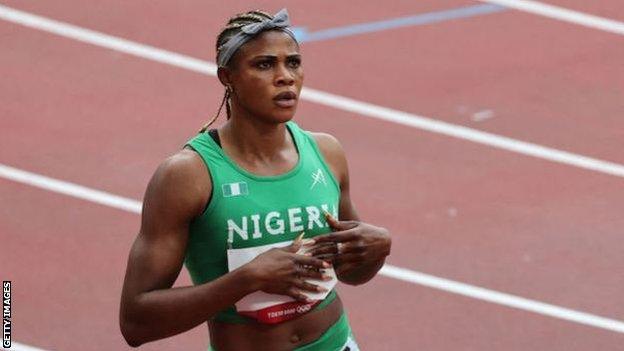Eric Lira pleads guilty to supplying performance-enhancing drugs to Olympic athletes
- Published

Blessing Okagbare won her 100m heat at the Tokyo Olympics before being suspended
A Texas man faces up to 10 years in prison after pleading guilty to supplying performance-enhancing drugs to Olympic athletes.
Eric Lira, 43, is the first defendant to be charged under a new US law introduced in the wake of Russia's state-backed Olympic doping scandals.
The 2020 law is named after Russian whistleblower Grigory Rodchenkov.
US Attorney Damian Williams said, external in a federal court the case was a "watershed moment for international sport".
The Rodchenkov Anti-Doping Act enables US authorities to prosecute individuals involved in "doping schemes for the purpose of influencing international sports competitions" including those who have not previously been governed by sport anti-doping laws
Lira was found to have supplied drugs to Nigerian sprinter Blessing Okagbare, who last year was banned from athletics for 11 years.
The 34-year-old was expelled from the Tokyo Olympics just before the women's 100m semi-finals after it emerged she had tested positive for human growth hormone in an out-of-competition test in Slovakia before the delayed 2020 Games.
Williams added: "Lira provided banned performance-enhancing substances to Olympic athletes who wanted to corruptly gain a competitive edge.
"Such craven efforts to undermine the integrity of sport subverts the purpose of the Olympic Games: to showcase athletic excellence through a level playing field.
"Lira's efforts to pervert that goal will not go unpunished."
Grigory Rodchenkov speaks to BBC sports editor Dan Roan in February 2018
The maximum sentence for violating the Rodchenkov Anti-Doping Act is 10 years in prison, although Lira's sentence will be determined by a judge at a later date.
"Without this law, Lira, who held himself out as a doctor to athletes, likely would have escaped consequence for his distribution of dangerous performance-enhancing drugs and his conspiracy to defraud the 2020 Tokyo Olympic Games because he did not fall under any sport anti-doping rules," said Travis Tygart, chief executive of the United States Anti-Doping Agency, in a statement., external
He added that the handling of Lira's case "sends a powerful message that the rules of sport matter and that the US is committed to rooting out and penalising fraudulent activity that robs clean athletes and the public.
"This is particularly important with many international events, including the 2026 Fifa World Cup and the 2028 Olympic and Paralympic Games, coming to the US soon."